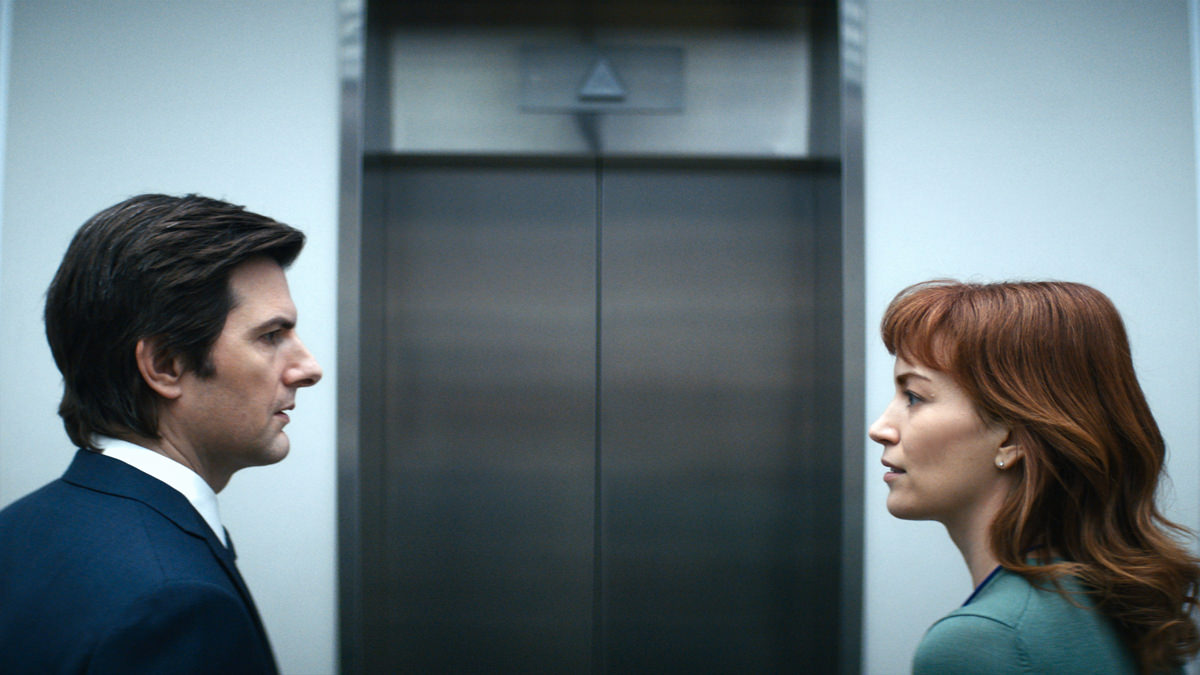
There’s no way to avoid how condescending this sounds, but we actually feel a little sorry for anyone who’s going to start watching Severance based on the buzz generated by what has to be – we’re just gonna say it – one of the greatest season finale cliffhangers of the last decade. While we have no doubt anyone could find the same level of enjoyment that we did watching this story unfold, it won’t have that intimate sense of discovery; like you turned a corner in a long hallway and found a little alcove all to yourself – or a room full of goats.
Like most Apple TV+ shows, Severance debuted with little fanfare. Unlike most Apple TV+ shows, that may have been to its benefit. Clicking on that first episode that first week, most viewers would likely have had no idea what the show was about, who was in it, and where it was going to go. We certainly didn’t, and it’s kind of our job to know these things. The first few episodes were an extremely slow burn; coming off like a mildly dystopian sci-fi story about end stage capitalism and the commoditization of human beings (a so-ironic-its-almost-unbelievable story to be hosted by Apple, of all companies). In truth, we felt like the show was treading familiar ground in its first installments. There have been more than a handful of evil corporation stories in the last few years, not to mention a roughly equal number of stories about people with fractured minds or memories. At first, we tried to take in the show as a sort of allegory about work/life balance because the actions and motivations of the characters were either so broadly drawn as to be caricature or so impenetrable as to be nonsensical. In our defense, performances like Patricia Arquette’s snarling, seething Miss Cobel/Mrs. Selvig or Tramell Tillman’s unsettling Mr. Milchick lend themselves to a surreal, David Lynch-ian sort of read on the show. But Lynch famously never explains his stories, leaving them up to the viewer to interpret, while Severance director Ben Stiller and show creator Dan Erickson have a clear understanding of where they want the viewer to land and how they’re going to get them to that point. Nothing’s weird just for the sake of being weird.
What makes Severance such an exceptional viewing experience is how tightly controlled a creation it is, patiently letting the reality it’s depicting unfold, guided by a creative team that understands exactly how a viewer’s mind is going to work, who then upends those expectations efficiently and economically. As a story, it doled out its revelations slowly and without much buildup; a series of mildly surprised “Oh” moments whose implications only become clear to the audience when they have time to think about them. Nothing is underlined or lampshaded, and foreshadowing is mostly used for misdirection. The result is a story with twists and turns that feel surprisingly intimate; like the storytellers suddenly turned directly to the viewer and started whispering secrets in their ear. Without spoiling too much, the revelation of who Mark’s wife was at the end of the sixth episode actually made our brains shut down for a second because we couldn’t process the information. We were so sure we knew where that reveal was going (“It’s gotta be [redacted]! It’s gotta be [redacted]!“) and the creators were so sure of our misguided prediction (Spoiler: it wasn’t [redacted]) that when the reveal happened, there was a split second feeling of “Wait. Can they hear us?” The last time we felt that kind of intimate connection between creator and audience was when Phoebe Waller-Bridge sadly shook her head at us at the end of Fleabag. That kind of writing; that understanding of how a viewer’s mind works and where it’s going to go, is so rare in television and it should be treasured. It feels like watching a master magician work your expectations and misdirect you flawlessly, only to reveal something so unexpected that it makes you briefly question the nature of reality.
The finale was an absolutely masterful episode of television in every measurable way: direction, cinematography, costume design, editing, sound design, and performances. The shot of Helly’s face as the glass elevator descended into the gala was heart-in-throat great, with the tension elevated not only by the blurry background rising behind her, but Britt Lower’s insanely good silent acting (she can do a LOT while barely moving a muscle on her face) and the kind of frenetically tense score that makes your anxiety spike as you wait for the final girl to meet the slasher. But when it comes to silent acting, no one can top John Turturro, who gave a master class in it all season. The way his face would soften at the sight of his beloved Burt was heartbreakingly good. It was only after the third viewing of the finale that we realized he only said one word the entire episode – but what a fucking delivery on that one word. Adam Scott holds the entire show together as both versions of Mark, finding the commonality in their shared personality while subtly illustrating the vast differences in their experiences. Watching him talk to his sister Devon (Jen Tullock, a flawless scene partner) as his Innie for the first time was full of little moments of wonder and confusion that flitted across his face. As for costumes, Helena’s gown and earrings continued and fulfilled the rigid blue-green Lumon industries aesthetic so powerfully rendered in the production design (Quick: what color is the carpet in Macrodata Refinement? Exactly.), the blue and green outfits she wore in the office, and the blue and green lights of the severance implant. There’s symbolism and easter eggs all over this show and we will happily leave them to the sites and Reddit threads that are best at finding and unpacking them. We’re more impressed and entertained by how well this show did everything a show is supposed to do and how it managed to do it all so quietly and confidently, building to an episode of exquisitely rendered tension and a payoff that simply can’t be beat for manipulating the audience’s emotions. The final sequence cutting between all of the Innies as they meet their fates and ending on that utterly maddening/curiously satisfying final line of “SHE’S ALIVE!” is just damn great filmmaking. What we’re trying to say without spoiling too much is “Go watch Severance because it’s not just really good but easily one of the best shows of the year.”
[Photo Credit: Apple TV+]
Heidi Klum in Moschino and Skims Outside AMERICA’S GOT TALENT Studios Next Post:
Galia Lahav Spring 2023 Bridal Couture ‘Rise’ Collection
Please review our Community Guidelines before posting a comment. Thank you!



